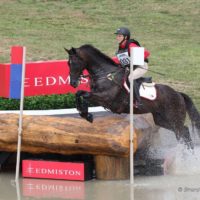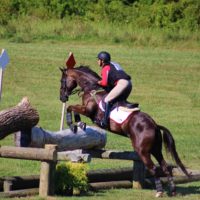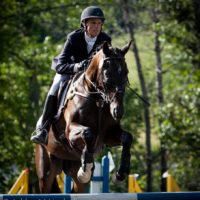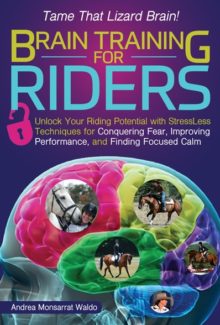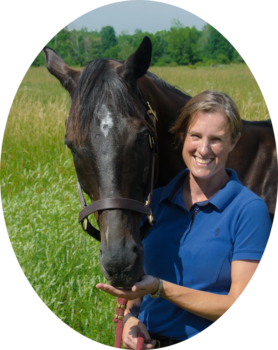 Whether you ride for pleasure or competition, your mental game is a critical part of your riding skill set. These articles provide concepts, skills and exercises to train your mind for maximum confidence and success, whether you’re aiming for a peaceful trail ride or a place on the winners’ podium.
Whether you ride for pleasure or competition, your mental game is a critical part of your riding skill set. These articles provide concepts, skills and exercises to train your mind for maximum confidence and success, whether you’re aiming for a peaceful trail ride or a place on the winners’ podium.
Have a particular riding issue you’re struggling with?
Andrea is available for individual consultations.
Information for Riders
Staying Positive With Covid-19: It’s Not Quite What You Think
There is a wave of commentary on social media at the moment insisting that we need to Stay Positive. “Stop being so negative! You should enjoy this time with your kids!” “I’m sick of negativity, post some happy pictures!” “Let’s talk about how many people have recovered from the virus, instead of how many have died!” “You can do anything with a positive attitude!” “I’m going to create my Best Career/Body/Life Ever during this quarantine!” “I’m being sooo productive!” By themselves, these posts are all well and good. It’s great to look at the good things, to be grateful for what we have, to keep moving forward. But as these part-chirpy, part-scolding, Relentless Positivity posts accumulate, they’re starting to do more harm than good, and here’s why: they’re trying to skip over our pain and go straight to I’M GOING TO DANCE IN THE RAIN GODDAMN IT AND I’M FINE….
The Equestrian’s Five Stages of Grief: Cold Snap Edition
It’s happened: those melodramatic Weather Channel headlines (ARCTIC COLD FRONT GRIPS MIDWEST AND NORTHEAST!!! MILLIONS BRACE FOR IMPACT!!) have actually come true. Your WTForecast app reads “-4 degrees, the cold is proof that either Mother Nature hates you, or the Earth is too far from the sun.” But you’ve got horses to take care of, whether they are your own at home, or, if you’re like me, a barn full of your boarders’ wimpy OTTBs, so out into the frozen tundra you go. One day of this you can handle, no problem. Two, and it starts to get tiresome. But as a former psychotherapist, I can assure you that, when the cold snap begins to enter its third straight day, you will start to go through the Five Stages of Grief. I’m here to reassure you that these stages are completely normal, and you WILL get through them. Stage 1:…
StressLess Riding Workshop: Train Your Brain for a Confident Ride! Sunday, Nov. 6, 2016
Do you struggle with confidence when you ride at home, in lessons, or at shows? Come learn how to tame your Lizard Brain–the “Fight or Flight” part of your mind–and ride effectively and confidently. You’ll identify ways to reassure your “inner lizard, ” escape from negative Brain Traps, and “own” your abilities. This is an unmounted workshop, appropriate for all levels and riding disciplines. Hosted by Winchester Stables, 336 River Rd., Newfane, VT. $65 per person. To register, contact Bevin Dugan at winchester.vt@gmail.com.
When In Doubt…Give Up
(Photo credit: Suzanne Adams) So I’m currently in Ocala, Florida, which is total heaven for an event rider. I’m fortunate to be here for a month, and the plan was to get a jump on the competition season so I can reach my goal of moving up another level by August of this year. I’m signed up to compete this weekend, just 12 days after arriving in Florida. When I sent in the entry, I thought, “No problem. I’m entering prelim, and Chauncy can jump around that in his sleep.” As usual, life and the Lizard Brain had other plans. Thanks to the fact that I tore a ligament in my arm last summer, I haven’t competed since the second week of August 2015. I didn’t even jump anything substantial for almost three months, and by the time I was ready for some real jumping, it was already time to…
Defining Success
It’s been a whirlwind three weeks. I rode in a clinic with an Olympian whom I’ve looked up to for forever, who nailed me on my weaknesses with amazing speed and accuracy. It was incredibly helpful, and equally humbling. Right afterward, Chauncy and I tackled the intermediate course at Millbrook, and then at GMHA. Our results were checkered, to say the least. I’ve racked up a ridiculous number of penalties in all 3 phases in the past two weeks, along with an Elimination—on cross country no less, where we can almost always count on going clear! I’m frustrated and disappointed in a lot of ways, but strangely enough, it doesn’t feel like failure. Well, not 100% true—it feels that way if I think of how my horse’s USEA record looks at the moment, and what that would mean if I tried to sell him tomorrow. But I think I’m finally…
5 Things Confident Riders Avoid
5 Things Confident Riders Avoid Recently I told you five things that confident riders do. There are also things they avoid doing so that they don’t damage their confidence. Here are five things that confident riders avoid: 1. They avoid thinking about all of the bad things that might happen. Confident riders don’t picture their horse spooking at the real estate sign or refusing the Liverpool jump. However, they’re not oblivious to potential problems either. Instead of thinking about what might happen, they make a plan about how they’re going to prevent a problem from occurring: “Before we get to the real estate sign, I will bend my horse away from it.” 2. They avoid beating themselves up for mistakes. Confident riders know that even the best equestrians make mistakes and have trouble spots. Instead of thinking “I’m a terrible rider” when they make an error, they think “What should…
Five Things Confident Riders Do
You may think that confidence is something that you either have or you don’t, but that’s not true. Confidence comes from taking risks, failing, learning, and trying again. It comes from practicing, succeeding and recognizing that you’re making progress. Here are five things that confident riders do that make them that way. 1. Confident riders are willing to risk failure. They operate just outside their comfort zone, which is where learning happens, so they make a lot of mistakes. They’re just as uncomfortable with mistakes as everyone else; they just do it so often, they get more comfortable with being uncomfortable. 2. Confident riders see failure as information; they don’t take it personally. This goes back to a quote attributed to Thomas Edison: “I haven’t failed 10,000 times, I’ve just discovered 10,000 ways that didn’t work.” Confident riders don’t think “Wow, I suck, I’m a terrible rider” when they make a mistake. Instead,…
Watch Your Language! How Self-Talk Can Hurt or Help Your Riding
“You should just sell your horse and quit riding. You’re never going to get any better so you might as well just give up.” “Everyone else here is better than you. You have no business being here. Everyone is laughing at you.” “You’re worse than a worm. You’re the worm at the bottom of the manure pile.” The above statements sound like the script for Mean Girls Go to the Horse Show. But these weren’t said by one teenaged girl to another. These are actual quotes that some of my clients say to themselves, both inside their heads and out loud. (And I did not make that last one up.) Of all the harmful thinking habits I know, Negative Self Talk (NST) is the most destructive. It cuts people off at the knees before they can even get started, and it can sabotage even the biggest success. Most people know…
Why Can’t I Think Straight When I’m Nervous?
Have you ever learned a jump course or dressage test by heart, only to have it vanish completely from your brain the second you enter the ring? In the warm-up, does your trainer’s voice sound like Charlie Brown’s teacher? When you’re nervous, do you find yourself reverting to bad habits such as leaning too far forward or tensing your hands on the reins? If so, you’re not alone. Almost everyone has difficulty thinking clearly when they are anxious. What is to blame for this frustrating phenomenon? The reptile brain. The human brain has evolved over millions of years. Our oldest ancestors, namely reptiles, had a brain stem at the top of the spinal cord that regulated body functions—breathing, heartbeat etc.—and contained a survival mechanism called the Fight or Flight Response (FOFR). The FOFR caused the heart to pump faster, breathing to increase, and the blood to rush to the animal’s…
Three Easy Steps to a Successful Warm-Up Ride: The BAR Method
When you go to any horse show in any discipline, you will witness very similar scenes in the warm-up area. Some people will be schooling their horses with purpose and clarity. Others look a little lost, and still others seem frozen like deer in the headlights. If you fall into one of the latter two categories, the simple acronym BAR can help you become more focused and effective. B=Breathe! You probably knew this was coming! As you go through your initial few minutes, usually walk/trot/canter in both directions, make sure that you Breathe deeply and evenly. Concentration, effort and nervousness all conspire to make breathing shallow and quick. This makes it harder to think and to feel what your horse is doing, and it creates tension in your muscles. Deliberately inhale smoothly and completely every few moments, and follow with a slow, complete exhale. A=Assess. Once you’re breathing, you need…
Winter Motivation, Where Art Thou?
It’s February…cold, snowy, and nowhere near spring! For those of us who can’t winter down south, green grass and warm temperatures seem a thousand years and a thousand miles away. Sometimes sinking into a deep armchair with a good book is much, much more appealing than going to the barn to ride! But this is the perfect time to work on all of those little details I always promise myself I’ll do “when I have more time to focus”–ride without stirrups, perfect that counter-canter, practice poles on the ground. So how to jump-start my motivation and get myself out of the house? Two things: lots of visual reminders of my big goals, and as much contact as possible with like-minded friends and colleagues. This means last year’s Rolex ticket posted on my refrigerator, and watching DVDs of Rolex, Badminton and Burghley, along with how-to videos from Jim Wofford and Lucinda…
AECs 2010
I recently returned from the American Eventing Championships in Fairburn, Georgia, where I competed with my two mares at training level. Both horses were terrific and came home with 7th and 20th placings out of a division of 54 riders! While I was there, I watched the Advanced Level riders closely, especially those who were vying for a place on the team for the World Equestrian Games. While some were clearly nervous, every one of them kept their bodies elastic and fluid and never interfered with their horses’ motion. They may have felt anxious, but they “acted as if” they were not–and it was clear in their faces that this “acting as if” actually created greater feelings of calm as their rides progressed. What a great lesson in maintaining focus!

